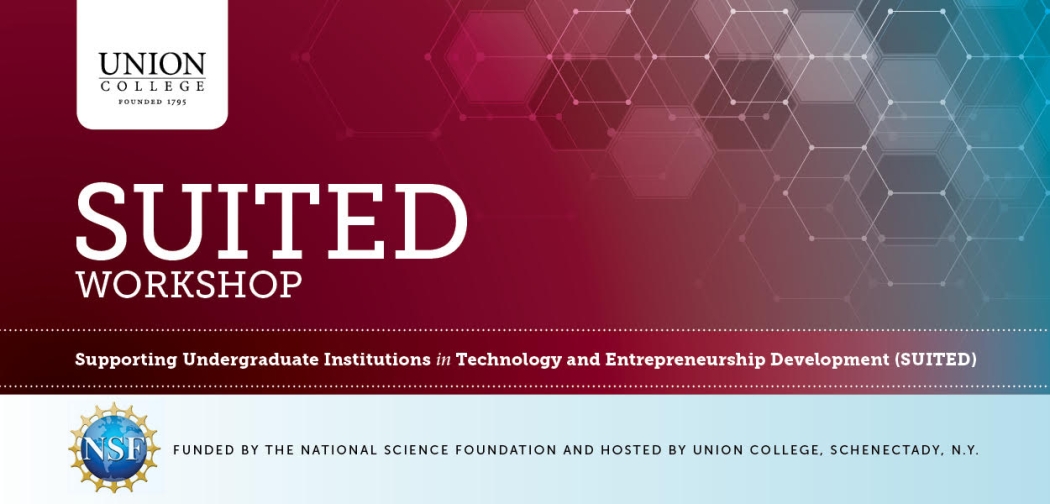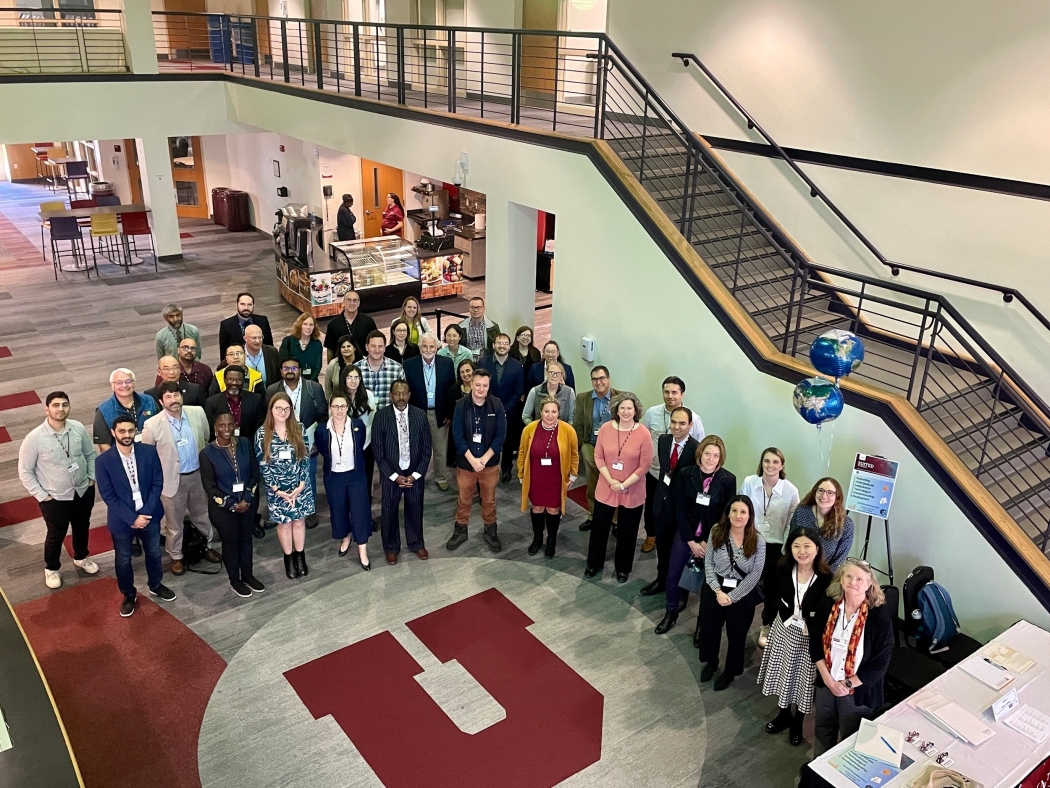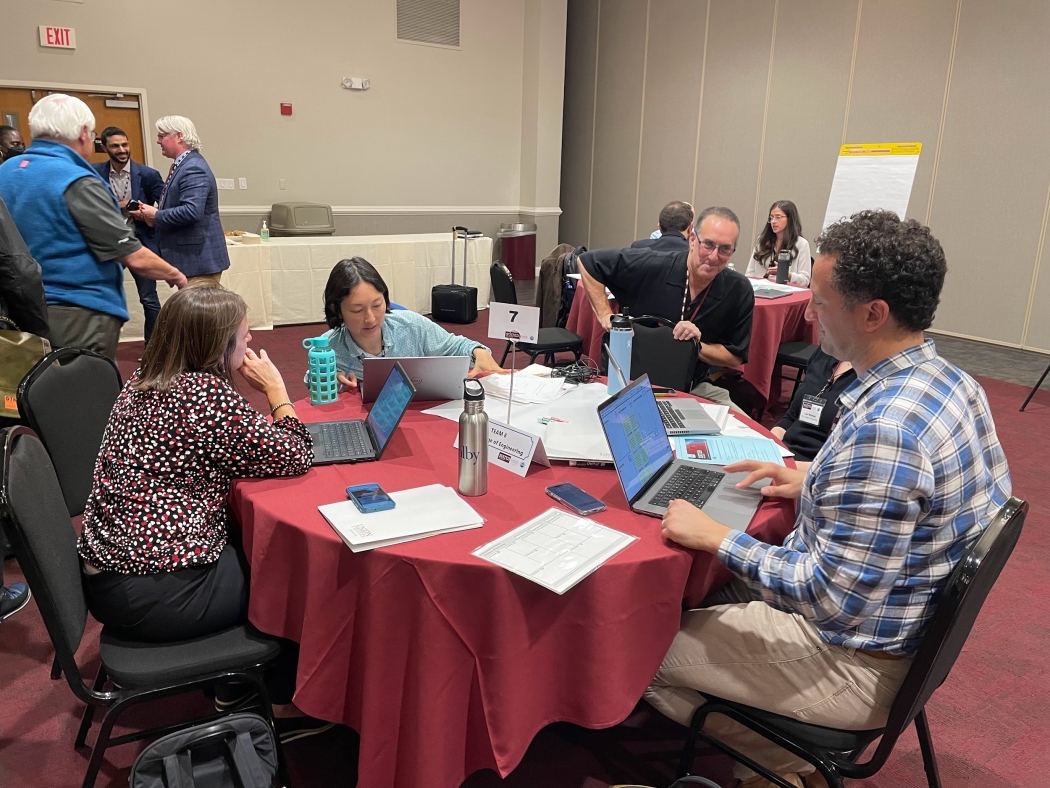
Supporting Undergraduate Institutions in Technology and Entrepreneurship Development (SUITED) Workshop
SUITED 2024: Moving research from lab to marketplace
November 1-2, 2024, Union College, Schenectady NY
The SUITED Workshop series is designed to help Primarily Undergraduate Institutions (PUIs) learn to better access the myriad benefits of Technology, Innovation and Partnership (TIP) activities* and help the National Science Foundation (and other key agencies and organizations) to better support and harness the power of PUIs.
SUITED 2024 will again bring faculty members from PUIs, ideally in teams that include administrators, to Union College to present their research ideas and receive informed feedback, initial assessment, and help planning next steps that might lead to commercialization or other entrepreneurial outcomes. The workshop will include lightning presentations by experts on key TIP-related topics (e.g. incubators, intellectual property, grant writing), one-on-one mentoring, and opportunities to network with like-minded faculty and others from PUIs. The final schedule is here. The 2024 program book is here. Information about SUITED 2023 can be found below.
Please consider joining us at SUITED 2024 to share lessons learned, ask questions and get answers, identify core challenges, and build a community of interest around furthering TIP at PUIs. Significant travel and lodging support will be available to participants. Application information will be posted in the spring.
Join our mailing list to receive updates.
The SUITED Workshop organizing committee:
- Ann M. Anderson, Agnes S. MacDonald Professor of Mechanical Engineering, Union College, Committee Chair, andersoa@union.edu
- John Blaho, Director, Industrial-Academic Research, CUNY Central - Division of Innovation and Applied Research
- Bradford A. Bruno, Professor of Mechanical Engineering, Union College
- Mary K. Carroll, Dwane W. Crichton Professor of Chemistry, Union College
- Diana Dabby, Professor of Electrical Engineering and Music, Olin College
- Jeff Goronkin, Technology Commercialization Expert and CEO, Urban Co-Works
- Mercedes Susi, Senior Associate Director of Sponsored Programs & Faculty Fellowships, Union College
- Emily Tong, Assistant to the Dean of Academic Departments and Programs, Union College
Support for the SUITED Workshop was provided by the National Science Foundation (Award #2225762). The opinions, findings, and conclusions, or recommendations expressed are those of the organizing committee/author(s) and do not necessarily reflect the views of the National Science Foundation.
~ ~ ~ ~ ~ ~ ~ ~ ~ ~ ~ ~ ~ ~ ~ ~ ~ ~ ~ ~ ~ ~ ~ ~ ~ ~ ~ ~ ~ ~ ~ ~ ~ ~ ~ ~ ~ ~ ~ ~ ~ ~ ~ ~ ~ ~ ~ ~ ~ ~ ~ ~ ~ ~ ~ ~ ~ ~ ~ ~
SUITED 2023 was held in two parts, a virtual workshop in January and an in-person workshop in October.


SUITED 2023 group picture and work session.
SUITED Workshop Shares Best Practices in Undergrad Tech Transfer and Entrepreneurship -- NY NSF I-Corps HUB (see article).
The workshop provided lots of tangible takeaways and guidance on next steps that I now feel equipped to start taking action about. -- SUITED 2023 Survey Respondent
This workshop was extremely useful,...I walked away with a lot of takeaways, a deeper understanding of this area and clarity on next steps. -- SUITED 2023 Survey Respondent
*Technology Innovation and Partnership (TIP) activities can support your core academic research, education, and broader societal missions.
- Learn, from those who have done it, how to overcome institutional challenges to participating in and obtaining support for TIP activities.
- Share your successes, receive feedback on plans, and build a like-minded community of interest around supporting TIP at undergraduate institutions.
- Provide feedback to NSF to help shape their policies and programs to better address the particular needs of and barriers faced by Primarily Undergraduate Institutions (PUIs) in participating in and obtaining support for TIP activities.
-
Union College Harassment Policy
Union College is committed to providing a safe, inclusive, and respectful learning, living, and working environment. To this end, Union will not tolerate gender-based misconduct. Union College’s Title IX Policy, Gender-based Misconduct Policy, and Policy Prohibiting Discrimination, Harassment, Bias, and Retaliation in Employment and their associated procedures define prohibiting conduct. Union College students, faculty, and staff as well as non-members are expected to comply with our policies. A “non-member” refers to independent contractors, vendors, visitors and others who conduct business with the College or on College property.
The College’s Policy Prohibiting Discrimination, Harassment, Bias, and Retaliation in Employment, the Student Code of Conduct, and the Gender-based Misconduct Policy have jurisdiction over all defined misconduct that effects or is a part of a Union College educational program or activity both on and away from campus. As such, matters of discrimination, harassment, or bias occurring off-campus involving parties associated with the College’s programs or activities will be ripe for adjudication within the College’s procedures.
Allegations of misconduct by non-members will be adjudicated through the College’s Rule of Public Order and/or through the referral of matters to the non-member’s institution for adjudication within the institution’s community standards or other applicable misconduct policies.
Conference participants can report incidents of gender-based misconduct including sexual harassment, sexual assault, dating and domestic violence, and stalking.
Conference participants can report incidents of bias by students.
Conference participants can report incidents of discrimination, harassment, bias, or retaliation by community members or non-members.
To learn more, please see our Title IX website.
- SUITED Workshop Part 2: Program Booklet for October 27-28, 2023
-
SUITED Workshop Part 1: Schedule on January 12-13, 2023
Thursday, January 12
*Times below are Eastern Standard Time
12:00-12:15 pm
Welcome
Ann Anderson (Union), Jesus Soriano (NSF), Michele Angrist (Union)
12:15-1:00 pm
A round-table discussion "Perspectives on the Role of Undergraduate Institutions in Advancing Technology and Innovation.”
Moderator: Mary Carroll (Union)
Participants: David Harris (Union), Jesús Soriano (NSF), Lisa Avila (Kitware, Inc.)
1:00-1:50 pm
Presentations by invited representatives from funding agencies and TIP practitioners to give an overview of programs
Moderators: Nicole Marshall (Union), John Blaho (CUNY)
Presenters: Jesús Soriano (NSF), Phil Weilerstein (Venturewell), John Blaho (CUNY)
1:50-2:00 pm
Virtual Break
2:00-3:00 pm
Stories from faculty at PUIs who have worked on commercializing technology that grew out of their research (Union, Olin, CUNY)
Moderators: Brad Bruno (Union), Jeff Goronkin (Urban Co-Works)
Panelists: Ann Anderson (Union), Stephanie Curley (Union), Diana Dabby (Olin), Jessica Fields (CUNY), Jose Madero (Bucknell)
3:00-3:15 pm
Virtual Break
3:15-5:00 pm
Breakout Session 1: Barriers. What are the primary barriers to technology development and commercialization activity at PUIs? Participants will be split into smaller groups for this activity with an identified moderator and note-taker for each group. Discussion points will include:
- Administrative support: What is needed?
- Reward systems (tenure/promotion/merit) – How would commercialization activities be evaluated and rewarded?
- Technology commercialization at undergraduate colleges - Is this something your institutional culture would accept?
Recap (with all participants)
Friday, January 13
12:00 – 12:50 pm
Presentation: Infrastructure for Technology Development & Commercialization (an overview of intellectual property, incubators, accelerators, technology transfer offices).
Moderator: Ann Anderson (Union)
Presenter: Shahrokh (Seve) Falati (New York Law School)
12:50 - 1:00 pm Virtual Break 1:00 - 2:45 pm
Breakout Session 2: Infrastructure. What do we need, what do we have, what are the best practices? Participants will be split into smaller groups for this activity with an identified moderator and note-taker for each group. Discussion points will include:
- Intellectual property – What are best practices for protecting intellectual property, how does one apply for and fund a patent?
- Tech transfer offices, tech transfer mentors – What do we do when a proposal requires a business mentor or commercialization expert and our institution does not have a tech transfer office?
- Access to accelerators/incubators/funding – Many major universities have these – how can undergraduate institutions benefit?
- Funding organization cost structures - Do they actively encourage PUI participation? (allowing course release, using wording on RFP that mentions post-baccalaureate researchers and technicians as well as graduate students, etc.)
Recap (with all participants)
2:45-3:00 pm
Virtual Break
3:00-5:00 pm
Breakout Session 3: Moving Forward. What do we do next? Participants will be split into smaller groups for this activity with an identified moderator and note taker for each group. Discussion points will include:
- How can PUIs work together? Can PUIs share resources? What sort of resources? (Shared tech transfer office? Shared IP attorney? Incubators?)
- Educational benefits of including technology development and commercialization activities at a PUI – Why is this good for the students? How do we set up structures to introduce undergraduate students in meaningful ways?
- Expanding the impact of this workshop to faculty and administrators at other PUIs – How can NSF, other funding agencies, and institutional administrations encourage more innovation and entrepreneurship activity?
Recap (with all participants)